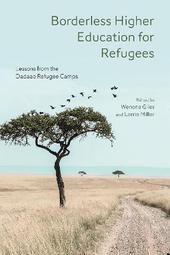
|
Borderless Higher Education for Refugees: Lessons from the Dadaab Refugee Camps
Hardback
Main Details
| Title |
Borderless Higher Education for Refugees: Lessons from the Dadaab Refugee Camps
|
| Authors and Contributors |
Edited by Wenona Giles
|
|
Edited by Lorrie Miller
|
| Physical Properties |
| Format:Hardback | | Pages:248 | | Dimensions(mm): Height 234,Width 156 |
|
| ISBN/Barcode |
9781350151246
|
| Classifications | Dewey:371.826914096762 |
|---|
| Audience | | Tertiary Education (US: College) | |
|---|
|
Publishing Details |
| Publisher |
Bloomsbury Publishing PLC
|
| Imprint |
Bloomsbury Academic
|
| Publication Date |
4 November 2021 |
| Publication Country |
United Kingdom
|
Description
Winner of the 2022 CIES Jackie Kirk Outstanding Book Award Higher education is increasingly recognized as crucial for the livelihoods of refugees and displaced populations caught in emergencies and protracted crises, to enable them to engage in contemporary, knowledge-based, global society. This book tells the story of the Borderless Higher Education for Refugees (BHER) project which delivers tuition-free university degree programs into two of the largest protracted refugee camps in the world, Dadaab and Kakuma in Kenya. Combining a human rights approaches, critical humanitarianism and a concern with gender relations and intersecting inequalities, the book proposes that higher education can provide refugees with the possibility of staying put or returning home with dignity. Written by academics based in Canada, Kenya, Somalia and the USA, as well as NGO workers and students from the camps, the book demonstrates how North-South and South-South collaborations are possible and indeed productive.
Author Biography
Wenona Giles, PhD, FRSC is Professor Emerita and Senior Scholar in the Anthropology Department and Resident Research Associate at the Centre for Refugee Studies, York University, Canada, where she has taught and published in the areas of gender, forced migration, globalization, migration, education, nationalism and war. She co-founded and co-coordinated the International Women in Conflict Zones Research Network (1993-2004). She initiated and then co-led the a multi-year project (2013-2019) funded by the Canadian government and the Open Society Foundations that continues to bring degree programs from Kenyan and Canadian universities to refugees in the Dadaab refugee camps of Kenya (www.bher.org). Lorrie Miller, PhD is Associate Director for IVET - Institute for Veterans Education and Transition in the Faculty of Education at the University of British Columbia, Canada. Her work with IVET supports the development of a Veteran friendly Campus in a Canadian context and related academic programs for military related learners as they transition from active service to civilian life through university education. Questions surrounding pedagogies of care drive her academic curiosity. What does and should education look like in challenging times, in fragile contexts, with a cross-section of learners? Her recent position in teacher education at UBC, as a program coordinator in the B.Ed program and post-degree diplomas, involved working closely with the BHER project as a coordinator and student advisor for those visiting UBC students who studied in Dadaab and worked towards completion of their diploma in Secondary Teacher Education. In addition, she is a textile artist and instructor, where slow and Indigenous pedagogies are woven throughout her teaching, art, and writing.
ReviewsThis book provides an honest and highly reflective account of the design and implementation of a higher education in emergencies project. The BHER story is told with a degree of humbleness and modesty regarding the inherently problematic initiative of a Northern/Western University to bring together a consortium/partnership with universities in the South and how it successfully navigated unequal power relations and neo-colonial patterns of thinking and acting. * Barbara Moser-Mercer, Visiting Professor, University of Nairobi, Kenya *
|